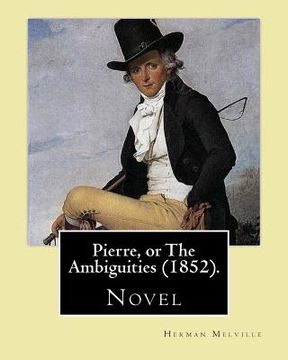Pierre, or The Ambiguities (1852). By: Herman Melville: Novel, the seventh book, by American writer Herman Melville. (en Inglés)
Reseña del libro "Pierre, or The Ambiguities (1852). By: Herman Melville: Novel, the seventh book, by American writer Herman Melville. (en Inglés)"
Pierre; or, The Ambiguities is a novel, the seventh book, by American writer Herman Melville, first published in New York in 1852. The plot, which uses many conventions of Gothic fiction, develops the psychological, sexual, and family tensions between Pierre Glendinning; his widowed mother; Glendinning Stanley, his cousin; Lucy Tartan, his fiancee; and Isabel Banford, who is revealed to be his half-sister. According to scholar Henry A. Murray, in writing Pierre Melville "purposed to write his spiritual autobiography in the form of a novel" rather than to experiment with the novel and incidentally working some personal experiences into it.Coming after the lukewarm reaction to Moby-Dick, Pierre was a critical and financial disaster. Reviewers universally condemned both its morals and its style. Critics have more recently shown greater sympathy, seeing it as a "psychological novel -- a study of the moods, thought processes, and perceptions of his hero." Plot: Pierre Glendinning, junior, is the 19-year-old heir to the manor at Saddle Meadows in upstate New York. Pierre is engaged to the blonde Lucy Tartan in a match approved by his domineering mother, who controls the estate since the death of his father, Pierre, senior. When he encounters, however, the dark and mysterious Isabel Banford, he hears from her the claim that she is his half-sister, the illegitimate and orphaned child of his father and a European refugee. Pierre reacts to the story (and to his magnetic attraction for Isabel) by devising a remarkable scheme to preserve his father's name, spare his mother's grief, and give Isabel her proper share of the estate. He announces to his mother that he is married; she promptly throws him out of the house. He and Isabel then depart for New York City, accompanied by a disgraced young woman, Delly Ulver. During their stagecoach journey, Pierre finds and reads a fragment of a treatise on "Chronometricals and Horologicals" on the differences between absolute and relative virtue by one Plotinus Plinlimmon. In the city, Pierre counts on the hospitality of his friend and cousin Glendinning Stanley, but is surprised when Glen refuses to recognize him. The trio (Pierre, Isabel, and Delly) find rooms in a former church converted to apartments, the Church of the Apostles, now populated by impecunious artists, writers, spiritualists, and philosophers, including the mysterious Plinlimmon. Pierre attempts to earn money by writing a book, encouraged by his juvenile successes as a writer. He learns that his mother has died and has left the Saddle Meadows estate to Glen Stanley, who is now engaged to marry Lucy Tartan. Suddenly, however, Lucy shows up at the Apostles, determined to share Pierre's life and lot, despite his apparent marriage to Isabel. Pierre and the three women live there together as best they can, while their scant money runs out. Pierre's writing does not go well - having been "Timonized" by his experiences, the darker truths he has come to recognize cannot be reconciled with the light and innocent literature the market seeks. Unable to write, he has a vision in a trance of an earth-bound stone giant Enceladus and his assault on the heavenly Mount of Titans. Beset by debts, by fears of the threats of Glen Stanley and Lucy's brother, by the rejection of his book by its contracted publishers, by fears of his own incestuous passion for Isabel, and finally by doubts of the truth of Isabel's story, Pierre guns down Glen Stanley at rush hour on Broadway, and is taken to jail in The Tombs. There Isabel and Lucy visit him, and Lucy dies of shock when Isabel addresses Pierre as her brother. Pierre then seizes upon the secret poison vial that Isabel carries and drinks it, and Isabel finishes the remainder, leaving three corpses as the novel ends.... Herman Melville (August 1, 1819 - September 28, 1891) was an American novelist, short story writer, and poet of the American Renaissance period.
Herman Melville (Nueva York, 1 de agosto de 1819-Nueva York, 28 de septiembre de 1891)1 fue un escritor, novelista, poeta y ensayista estadounidense, del período del Renacimiento estadounidense. Entre sus novelas más conocidas están Taipi (1846), basada en sus experiencias en la Polinesia, y la novela Moby Dick (1851),1 considerada su obra maestra y un clásico de la literatura universal.
Entre 1853 y 1855, publicó en la revista Putnam Magazine una serie de relatos, reunidos la mayor parte de ellos en The Piazza Tales, entre los que se encuentran dos de las narraciones más importantes de Melville: el cuento Bartleby, el escribiente y la novela corta Benito Cereno. También aparece el relato Las encantadas, compuesto de diez bocetos sobre las islas Galápagos unidos por un solo narrador. En 1857, El estafador y sus disfraces, también conocido como El embaucador (The Confidence-Man), fue el último trabajo de ficción en prosa que publicó. Buscando estabilidad económica, abandonó el oficio de escritor, aceptando un puesto como inspector de aduanas.
En sus últimos años, en los que tuvo que padecer además de la muerte de dos de sus hermanos también la muerte de dos de sus hijos, Clarence, por tuberculosis y Malcolm por un posible suicidio, además de la muerte de otro de sus hijos a los treinta y cinco años, Stanwix Melville, se dedicó a escribir poesía. Battle-Pieces and Aspects of the War, de 1866, es una reflexión poética sobre la Guerra de Secesión y Clarel: A Poem and Pilgrimage in the Holy Land, un poema épico de ficción, publicado en 1876. La novela Billy Budd, que dejó inconclusa y fue publicada póstumamente en Londres en 1924, es considerada una de las obras de mayor relevancia de la literatura estadounidense.
Ver más
Ver menos

